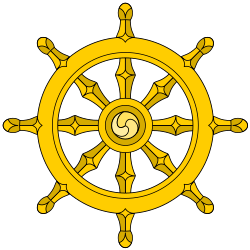Cheng Weishi Lun
| Part of a series on |
| Buddhism |
|---|
 |
|
Cheng Weishi Lun (Chinese: 成唯識論; pinyin: Chéng Wéishì Lùn) or Discourse on the Perfection of Consciousness-only, is a comprehensive discourse on the central teachings of Yogacara framed around Vasubandhu's seminal Yogacara work, Triṃśikā-vijñaptimātratā (Thirty Verses on Consciousness-only). It was written by the early Tang dynasty monk Xuanzang. It is sometimes referred to as Vijñaptimātratāsiddhi, its equivalent name in Sanskrit.
Origins and importance
When Xuanzang was studying Buddhism in India at Nālandā University, he discovered ten commentaries on Vasubandhu's Triṃśikā-vijñaptimātratā. He drew upon these commentaries, especially the commentary of Dharmapāla, when writing his own detailed explanation of the Triṃśikā-vijñaptimātratā, which became the Cheng Weishi Lun.[1]
The Cheng Weishi Lun became one of the key texts of East Asian Yogācāra, both by Chinese ("Faxiang") and Japanese ("Hossō") thinkers.
English translations
Wei Tat translated the Cheng Weishi Lun into English for the first time in Hong Kong in 1973.[2] This translation is based upon Louis de La Vallée-Poussin's early translation into French (Vijñaptimātratāsiddhi: La Siddhi de Hiuan-Tsang). Wei's translation is now out of print and difficult to find. More recently, Francis Cook made a new English translation of the text for the Numata Center for Buddhist Translation and Research's Taishō Tripiṭaka translation effort.[3]
See also
References
- ↑ Cook, Francis (1999). Three Texts on Consciousness Only. Berkeley: Numata Center for Buddhist Translation and Research
- ↑ Wei Tat, Ch'eng Wei-Shih Lun: The Doctrine of Mere-Consciousness, Hong Kong: The Ch'eng Wei-Shih Lun Translation Committee 1973, ASIN B0007CDXQE
- ↑ Cook, Francis H. (1999), Three Texts on Consciousness Only, Berkeley: Numata Center for Buddhist Translation and Research, ISBN 1-886439-04-4
Bibliography
- Lusthaus, Dan (2003). Buddhist Phenomenology: A Philosophical Investigation of Yogacara Buddhism and the Ch'eng Wei-shih Lun, Routledge Critical Studies in Buddhism, ISBN 0415406102
- Schmithausen, Lambert (2015). On the Problem of the External World in the Ch’eng wei shih lun, International Institute for Buddhist Studies
- Sharf, Robert (2016). Is Yogacara Phenomenology? Some Evidence from the Cheng Weishi Lun. Journal of Indian Philosophy 44 (4), 777–807
- Jiang, Tao (2005). "Alayavijnana" and the problematic of continuity in the "Cheng Wei-shih Lun", Journal of Indian Philosophy 33 (3), 243-284 – via JSTOR (subscription required)